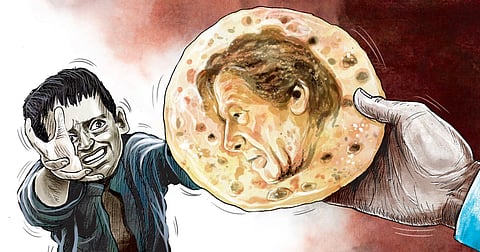

Pakistani Prime Minister Imran Khan showed up at the World Economic Forum in Davos, Switzerland, last week to rub shoulders at that exclusive conclave with the world’s super-rich and powerful people. His meeting with US President Donald Trump there was the icing on the cake for him. If one were to believe that small segment of the Pakistani news media that habitually fawns over Imran, his was a star appearance and stellar performance at Davos. But for those who knew better, it was more a welcome escapade for him, though shortlived, from the rough and tumble of governing a country as mottled as Pakistan. Lurking all the time in the shadows, while he was hobnobbing with world celebrities, was a crisis whipped up by the sheer incompetence and insouciance of his government. Pakistanis, by and large, are a wheat-consuming people.
The country has been self-sufficient in wheat production for years. In fact, it had a huge surplus of nearly seven million tons of wheat in its barns until the summer of last year. Back then, against the advice of his Commerce Ministry, Imran, coaxed by vested interests ensconced within his Cabinet, allowed all that wheat to be exported. A Pakistan starved of hard currency reserves needed the money earned for its coffers. But to his utter horror, Imran was awakened to a severe atta (flour) shortage hitting the poor consumers of their staple food. Flour mills, out of their limited stocks and shorn of fresh supplies of wheat, came to a grinding halt.
Flour outlets shuttered down, and people started howling and hollering for bread. Sharks among the traders, prowling in the wings to make their kill in times of shortages, jacked up the flour prices. In a matter of days, flour prices shot up, from 35 Pakistani rupees a kilogram to 70 Pakistani rupees. Pakistan’s first Bonaparte, Field Marshal Ayub Khan, ruled for 11 years with phenomenal success. The industrial progress of Pakistan on his watch remains unsurpassed, to date. However, his Waterloo came in 1969, not atthe hands of critics of his autocratic rule, but because of a crisis whipped up by shortages of sugar. Ayub’s sugar debacle had been preceded by the kind of steep rise in flour prices currently hobbling Imran. In the teeth of that crisis, the famous ‘revolutionary’ poet Habib Jalib gave the harassed consumers a stirring call to rise and revolt.
His poem Aisey dastoor ko … mein nahi manta (“I don’t accept such a black law”) has become a battle cry now in India too. In what is eerily reminiscent of factors that snowballed to bring down Ayub 50 years ago, Imran must shudder at the prospect of a sugar alarm raising its ugly head on the heels of the yet unresolved flour crisis. A bulk of Pakistan’s sugar mills is owned by its politicians and feudal barons whose roots run deep in the country’s arcane political culture. For instance, the family of discredited former PM Nawaz Sharif owns half a dozen, or more, sugar mills. So does the clan of notorious former President Asif Ali Zardari.
Many other prominent political families are also into sugar production. Some of Imran’s closest political comrades and colleagues are also among the league of sugar mills owners. They may bicker bitterly with their rivals on political issues but in matters of sugar production and its ancillaries, they are at one with their political foes. Together they form what’s popularly known in Pakistan as the sugar mafia. Imran had made his entry into the political arena a quarter century ago to fight and root out all mafias and cartels from Pakistan’s political landscape. But now, in power, he is being put on the defensive by the shenanigans and greed of some of his closest lieutenants.
The biggest dilemma staring him in the eye is how to corner the flour and sugar mafias without losing political support, while also guarding against the rapid erosion of his popularity with the masses. He’s in a Catch-22. At the same time, another monster threatening to pull the rug from under his feet is the fault lines becoming increasingly exposed within his own party. He is blamed of being controlled and exploited by a coterie of vested interests around him, which enrages the younger cadre of his ruling party. His populist base is plummeting in the province of Khyber Pakhtunkhwa, which has been ruled by his party since 2013. A similar storm of discontent against him is brewing in Punjab, Pakistan’s largest province with 65% of its population.
Imran’s party is in coalition there with several minor parties, but there’s almost a rebellion against its lacklustre Chief Minister Usman Buzdar, who was a non-entity until he was anointed by Imran. Things are becoming uglier by the day in Punjab due to Imran’s puerile refusal to let go of his acolyte. To the consternation of those who had pinned great hopes on Imran hammering out a ‘new Pakistan’ their moral crusader and knightin- shining-armour is running out of steam and failing. But it is largely because of his own doings.